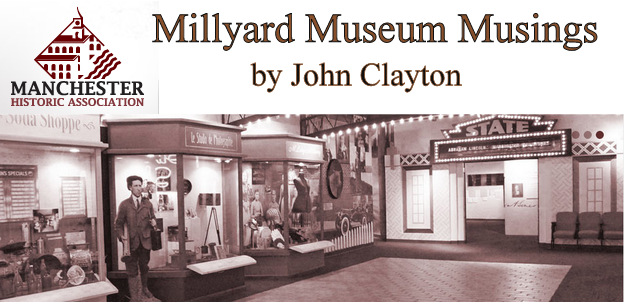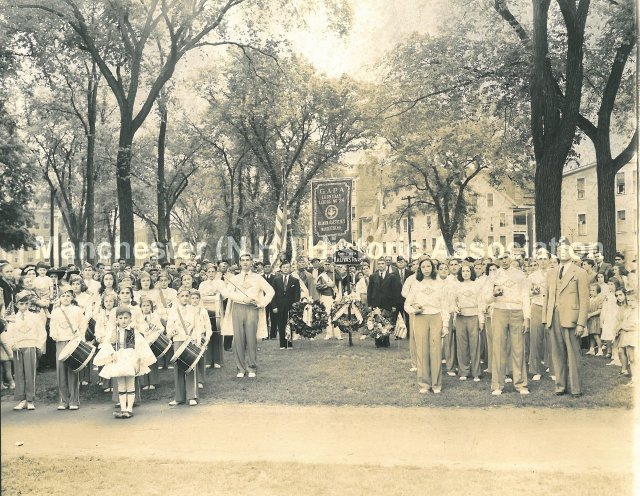
I guess I should have remembered that line about ”Greeks bearing gifts” when I saw George Copadis (The Younger) walking across the Millyard Museum with a tray of pastry.
As it is, I was caught with my guard down – just like the Trojans.
See, George has been trying to bribe me into doing a column about Glendi, the big Greek festival that begins on Friday, but you’ll be happy to know I didn’t surrender my journalistic integrity for a couple pieces of baklava.
No sir. I held out for some finikia, too.

To fully appreciate the spirit of Glendi, however, I think you need a little background on the local Greek community. But first – with apologies to my sixth grade teacher, the late Stavrula Theodosopoulos – let’s review what I know of ancient Greek history.
As we all know, Greece has given us many of the Great Minds of Civilization, like Plato, Aristotle and Socrates (and if I don’t mention Chris Spirou’s name here, he’ll kill me). Greece has also given the world a host of famous leaders like Alexander the Great, not to mention less famous leaders like Philip the Mediocre and Otto the Barely Average.
Through the ages, Greece has also given us many critically-acclaimed poets and authors, several of whom had very short by-lines, like Aesop and Virgil and, of course, Homer, who produced works of literature so famous that many of them are still inflicted on college freshmen today, such as ”The Iliad,” ”The Odyssey” and ”The Appendectomy.”
In addition, Greece has also given us a number of famous mathematicians, but I don’t think we should hold that against them.
Seeing as how space is limited here, we’re going to skip a millennium or two and jump right to 1893. That’s the generally accepted date of arrival for the Queen City’s first Greek immigrant – Doc Zervoudakes – a physician who came to Manchester from Crete via Montreal.
While his arrival drew little notice back then, it was an item of singular historic significance for Manchester, because subsequent Greek immigrants – and their off-spring – have enriched this community beyond measure.
As they were to the Irish who came before them, the Spruce Street tenements were a magnet for the first Greek immigrants, and even though outsiders saw the Greeks as a monolithic community, it was really a mosaic representing Macedonia, Thessaly, Peloponnesus and the Aegean Islands.
Naturally, since many of the men came to raise money for dowries, they sought work in the mills. But, an abundance of French-Canadian and Irish workers – not to mention an unspoken agreement by overseers at Amoskeag Manufacturing – relegated most of what the newspapers referred to as the ”dark-skinned aliens” to the shoe shops.
As the influx of Greeks continued, the expanded labor pool drove down wages – this is the economics part of our lesson – and that circumstance made the Greeks about as welcome in Manchester as they might have been in Istanbul.
Anti-Greek sentiment reached a peak here on July 11, 1905, when a riot broke out at Park Common. It seems three Irish boys jumped a Greek named Nicholas Pantackos with a bat and, well, let’s just say Nick took one for the team, not that you’d know it from this highly unbiased report in the ”Daily Mirror and American”:
”The battle was between the South End Greeks and their embittered rivals of other nationalities,” the Mirror claimed, ”men whose work had been taken from them or whose wages had been reduced to a meager pittance by the coming of the cheap Greek laborers who could live for a few cents a day and would work for whatever was given them.”
Wow. Wonder if that writer was a Turk?

For the next week or so, there were, ahem… rumbles of discontent, but if you’re wondering about the ultimate outcome of the skirmish, you might note that Park Common is now called Kalivas Park, in honor of Christos Kalivas, a World War I hero of Greek extraction. To the Greeks, the park was their village square – mesochori – and as their numbers increased, the area around Spruce Street became the most densely settled Greek community this side of Athens. Greek markets (called agoras) flourished, as did butcher shops, bakeries and coffee houses.
Of course, the coffee houses offered far more than coffee for Greek males. You could play a couple hands of xeri or pick up a copy of Spiros Cateras’s local Greek newspaper, ”Ergatis,” sure, but a coffee house also served as a vital employment office where George Copadis (The Elder) helped immigrants find work, or as an important social center where James Costakis helped translate immigration papers.
If the men had their coffee houses, the primary social outlet for women in this male-dominated culture was to be found in the church. Thus, incorporation of St. George Greek Orthodox Church – three months after the riots – was yet another significant milestone in the assimilation process.
So was strength in numbers. Census figures show just 12 Greeks in Manchester in 1900. In 1910, there were 1,330 and by 1920, the count was up to 3,730.
Except for a minor holy war that splintered the local Greek community in 1936, a remarkable sense of unity still prevails, as evidenced by the way locals rattle off the names of those who have advanced the Greek cause in Manchester.
They still speak with pride of Iphigenia Copadis, an influential woman in a man’s world whose Greek language magazine, ”Hellenida,” was distributed all over the world from right here in Manchester.
They honor the name of Col. Peter Clainos, the first American of Greek descent to be graduated from West Point and they cite the valor of Christos Karaberis, who received the Congressional Medal of Honor in World War II.
They remember Constantina Couchoukas and Chris Agrafiotis as the first Greek teachers in the city school system, just as they cherish the lessons learned at ”Puritan Prep,” the landmark restaurant where Louis Canotas, Arthur Pappas and Charles Gouliamas gave so many kids their first job.
They tell tales about the first Greek cop in Manchester, George Kousios, just as they pass on the legends of athletic greats like Gus Zitrides, John Kilonis, Spike Papageorge, Billy Pappas and Andy Prutsalis, the ”Galloping Greek” from the J.F. McElwain All-Stars.
Today, members of the Greek community still honor the accomplishments of those leaders recently passed – such as attorney Kimon Zachos and businessmen like Plato Canotas and Harry Theodosopoulos – and they equally embrace the success of the next generation, as embodied by Mayor Ted Gatsas, Executive Councilor Chris Pappas and Dr. James Vailas.
I guess it’s the sense of history and tradition among the Greeks that makes Glendi such a special event, and speaking of history, if the second hand on my watch is correct, it’s been 122 years since the first Greek immigrant arrived.
What say we meet at Glendi this weekend to toast to the next hundred years?
I’ll make George bring the ouzo.
Everything you need to know to find your way to Glendi:
- Friday 9/18, 11 a.m. – 10 p.m.
- Saturday 9/19, 11 a.m. – 10 p.m.
- Sunday 9/20, 11 a.m. – 3 p.m.

- 650 Hanover Street, Manchester, NH
- Free admission. Credit and debit cards accepted.
- Free shuttle service

John Clayton is Executive Director of the Manchester Historic Association. You can reach him with your historical (or existential) questions at jclayton@manchesterhistoric.org.
 You’re one click away! Sign up for our free eNewsletter and never miss another thing
You’re one click away! Sign up for our free eNewsletter and never miss another thing








